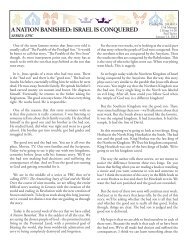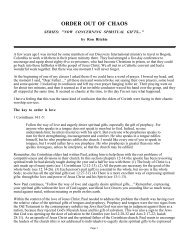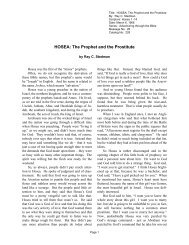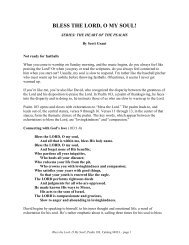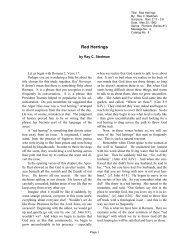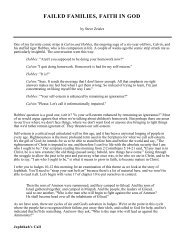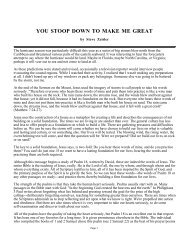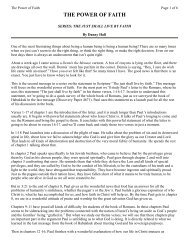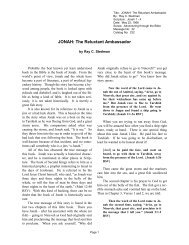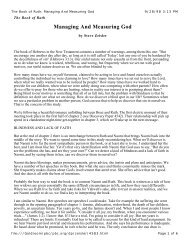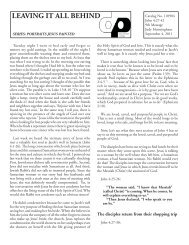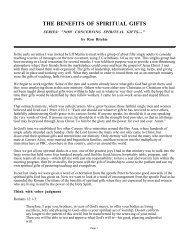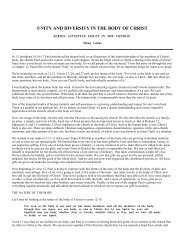jonah--experiencing god's salvation - Peninsula Bible Church
jonah--experiencing god's salvation - Peninsula Bible Church
jonah--experiencing god's salvation - Peninsula Bible Church
You also want an ePaper? Increase the reach of your titles
YUMPU automatically turns print PDFs into web optimized ePapers that Google loves.
That is a compelling story, but it is not about the God of the <strong>Bible</strong> and the God of Jonah's experience. The truth isthat God finds us, whether we are aware of it or not. Because he confronts us, we then turn to him. God brings usto a place where we have to admit that we have no other hope but him; there is no possibility of making it throughthe crisis that has resulted from our own sin unless he intervenes. That is because before God resurrects us fromthe grave that we have carefully dug for ourselves he wants us to deal with the death that comes from sin. ("Thewages of sin is death," says Paul in Romans 6:23.) He wants us to understand our sin-sickness before he will healus and provide the gift of eternal life.The song ends in verses 8 and 9 with Jonah's expression of praise and worship:Those who pay regard to vain idolsforsake their true loyalty.But I with the voice of thanksgivingwill sacrifice to thee;what I have vowed I will pay.Deliverance belongs to the LORD!Interpreters disagree on whom Jonah is talking about in verse 8 because it is a difficult construction. There areonly five words in the sentence in Hebrew. It's hard to tell whether the focus is on the Jewish people, who perhapsare tempted to idolatry; or Jonah himself and his pride, for there is something idolatrous in his running away; or,most likely, the Phoenicians who throw him into the ocean and the Assyrians he is called to minister to. He issaying of those people that they cling to worthless idols, but eventually they will abandon their loyalty to them.The idols will prove themselves untrustworthy and impotent.Verse 9 says, "But I..." which is a strong note of contrast. His allegiance, loyalty, and love are now focused on theGod of the universe. Some people have thought that perhaps Jonah is bargaining with God here: "If I get out ofhere I'm going to serve you, praise you, thank you--whatever you want." But this is a declarative statement; he isdeclaring that he has already been saved by God. It is an honest expression both of his understanding of how Goddelivered him personally and of his worship of God just as the Phoenician sailors worshiped God with their wholehearts out of gratitude.The tragic irony is that when God extends the same <strong>salvation</strong> to the Assyrians in Nineveh, Jonah will become veryangry. And when we look at verses 8 and 9 together we see a bit of self-righteousness in Jonah: "You saved me,but I don't embrace idolatry as those people do." But it is a gradual process of <strong>salvation</strong> that is going on. Godwants honesty, and he gets it from Jonah. And God understands the ambivalence in Jonah and can deal with thatparadox.Let me suggest several practical and personal truths we can derive from Jonah's surprising <strong>salvation</strong> by God'sintervention through the whale and from this song of <strong>salvation</strong> that Jonah composed while he was still in the bellyof the whale. The first one is that we must learn how to pray in the midst of failure, the times when our distresshas been caused by our own disobedience. Usually that is when it is the most difficult to pray because ourself-condemnation is at work, and we think that either we have no right to call on God, or he will pay no attentionto us. One of the points of this story is that if even an unattractive, unsympathetic, disobedient character like Jonahcould pray while he suffered consequences that he brought on himself, then so can we. God meets us even in ourself-imposed struggle and difficulty.The second truth is that we must learn to thank the Lord for confronting us with our disobedience. The stormconvinced Jonah that he couldn't escape from God; his rebellion was exposed. It is a great source of hope for us toknow that God will not let us continue forever in our own personal brand of rebellion. It would be the worstpossible news if we thought that God didn't care enough about us to catch us when we ran away from him.The third truth has to do with seeing ourselves in Jonah's life. Last week I talked about looking in the mirror ofthis book. When it comes to relating to God, all of us are, like Jonah, escape artists. Some of us spend our lives



